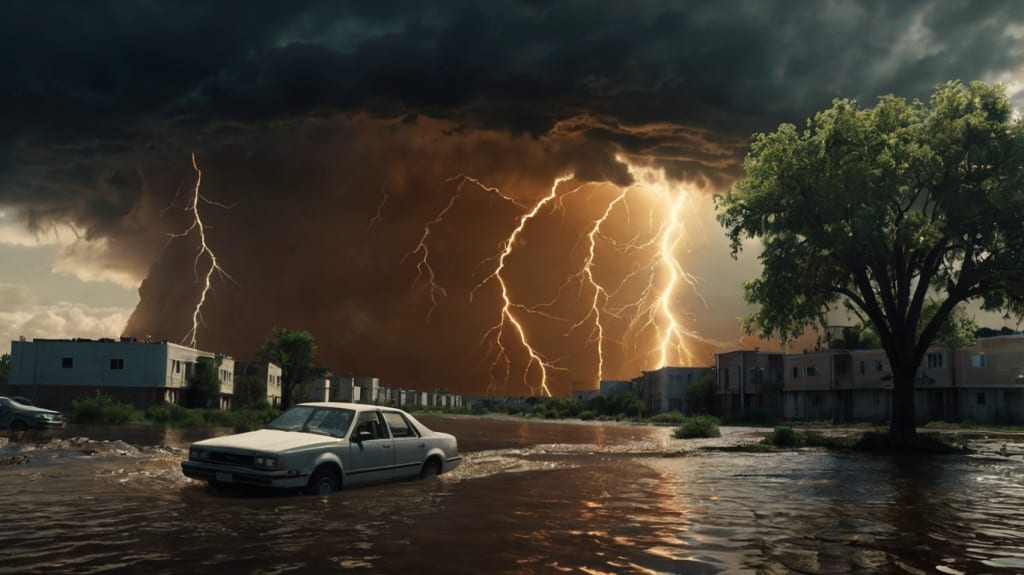Contents
- 0.1 Types of Extreme Weather Events
- 0.2 Climate Change and Extreme Weather
- 0.3 The Economic Impact of Extreme Weather
- 0.4 Impact on Human Health and Safety
- 0.5 Preparedness and Mitigation Strategies
- 0.6 The Role of Governments and International Cooperation
- 0.7 The Urgency of Addressing Extreme Weather Phenomena
- 1 Author
Extreme weather phenomena refer to unusual or severe weather events that deviate significantly from the typical conditions in a given region. These events often have dramatic consequences on human society, ecosystems, and infrastructure. Extreme weather can manifest in various forms, including intense heatwaves, massive storms, prolonged droughts, and devastating floods. Understanding these phenomena is crucial to mitigate their impacts and adapt to the changing climate.
Types of Extreme Weather Events
Extreme weather events come in various shapes and sizes, each posing unique challenges to people and the environment. The most common types of extreme weather phenomena include hurricanes, tornadoes, heatwaves, blizzards, and floods.
Hurricanes, also known as typhoons or cyclones depending on the region, are massive tropical storms characterized by strong winds, heavy rainfall, and storm surges. These storms can cause widespread destruction, especially in coastal areas. Tornadoes, on the other hand, are rapidly rotating columns of air that can produce winds exceeding 200 miles per hour, capable of destroying everything in their path. Heatwaves, a prolonged period of excessively hot weather, can lead to health crises, crop failures, and water shortages.

Blizzards are severe snowstorms with strong winds and low visibility, often resulting in transportation disruptions and dangerous living conditions. Floods, often caused by heavy rainfall or melting snow, can submerge entire regions, displacing communities and causing extensive property damage.
Climate Change and Extreme Weather
The link between climate change and extreme weather events is becoming increasingly evident. As global temperatures rise due to human activities, such as burning fossil fuels and deforestation, the atmosphere becomes more unstable, creating favorable conditions for extreme weather. Warmer temperatures allow for more moisture to be held in the air, leading to heavier rainfall and more intense storms. This is evident in the growing frequency and intensity of hurricanes and floods in many parts of the world.
Moreover, the warming of the Earth’s surface causes polar ice to melt, contributing to rising sea levels. This, in turn, increases the risk of coastal flooding and storm surges during extreme weather events. Scientists have observed that extreme weather events, such as heatwaves and wildfires, are becoming more frequent and severe as the planet continues to warm.
The Economic Impact of Extreme Weather
The economic impact of extreme weather phenomena is significant and far-reaching. In addition to direct damage to homes, businesses, and infrastructure, these events often disrupt supply chains, agriculture, and tourism industries. The costs of repairing infrastructure, providing disaster relief, and rebuilding communities can run into billions of dollars.
For instance, the economic cost of hurricanes and typhoons can be staggering, with entire cities and regions suffering from the aftermath of such storms. Insurance companies also bear a significant portion of the financial burden, as they pay out claims for damaged properties and infrastructure. In some cases, extreme weather can lead to a slowdown in economic growth, particularly in developing nations that lack the resources to recover quickly.
Furthermore, extreme weather can have long-term effects on agriculture, leading to crop failures, livestock losses, and reduced food production. Droughts, for example, can devastate farming communities, leading to food shortages and price hikes.
Impact on Human Health and Safety
Extreme weather events pose significant threats to human health and safety. Heatwaves, for example, can cause heat-related illnesses such as heatstroke and dehydration, especially in vulnerable populations such as the elderly, children, and those with pre-existing health conditions. These health risks are compounded in areas without adequate access to cooling systems, clean water, or healthcare services.

Similarly, floods can lead to waterborne diseases, as stagnant water may carry harmful pathogens. Hurricanes and tornadoes pose immediate dangers due to their high winds and the debris they can throw, leading to injuries and fatalities. In addition, the psychological toll of experiencing extreme weather events, such as the trauma of losing a home or a loved one, can be long-lasting.
The strain on healthcare systems in the aftermath of extreme weather events is also a major concern. Hospitals and clinics may become overwhelmed with patients requiring medical attention, and the availability of emergency services may be limited due to infrastructure damage.
Preparedness and Mitigation Strategies
Given the increasing frequency of extreme weather events, it is crucial for communities, governments, and individuals to take proactive measures to prepare for and mitigate their impact. Preparedness involves having contingency plans in place to evacuate affected areas, provide emergency supplies, and restore essential services as quickly as possible.
Building resilient infrastructure is another important strategy. This includes designing buildings and transportation systems that can withstand extreme weather conditions, such as reinforcing homes to resist hurricane winds or constructing flood barriers. Urban planning also plays a critical role in reducing vulnerability, by ensuring that new developments are not built in flood-prone areas or other hazardous locations.
In addition to physical preparedness, there is a need for improved early warning systems. Technology can help monitor weather patterns and provide timely alerts to communities at risk, allowing people to evacuate or take necessary precautions before disaster strikes. Public education campaigns on disaster preparedness can further empower individuals to take appropriate actions to protect themselves and their families.
The Role of Governments and International Cooperation
Governments at all levels have a crucial role to play in addressing extreme weather events. They must prioritize climate change adaptation and disaster risk reduction in their policies and investments. This involves increasing funding for research on climate science, implementing stricter regulations on greenhouse gas emissions, and developing long-term strategies to mitigate the effects of climate change.
International cooperation is also vital in tackling extreme weather phenomena. Extreme weather events often transcend national borders, making it essential for countries to work together in providing humanitarian assistance, sharing scientific knowledge, and addressing the root causes of climate change. Global agreements, such as the Paris Agreement, aim to reduce global warming and mitigate the frequency and severity of extreme weather events.

Furthermore, countries that are most vulnerable to extreme weather, such as small island nations and developing countries, need support from wealthier nations in terms of funding, technology transfer, and capacity-building to better cope with the impacts of extreme weather.
The Urgency of Addressing Extreme Weather Phenomena
In conclusion, extreme weather phenomena are a growing threat to the well-being of our planet and its inhabitants. From hurricanes and tornadoes to heatwaves and floods, these events have wide-ranging consequences for human society, the economy, and the environment. The connection between climate change and the increasing frequency of extreme weather is undeniable, making it imperative for governments, industries, and individuals to take action.
While we cannot completely prevent extreme weather events, we can minimize their impact through proactive preparedness, effective mitigation strategies, and global cooperation. Addressing the root causes of climate change, investing in resilience, and improving disaster response systems will be crucial in safeguarding the future of our planet and its people. The time to act is now, as the effects of extreme weather are only expected to worsen in the coming decades.
Also read this article: Salted Egg: Nikmatnya Cita Rasa Khas yang Menggugah Selera



